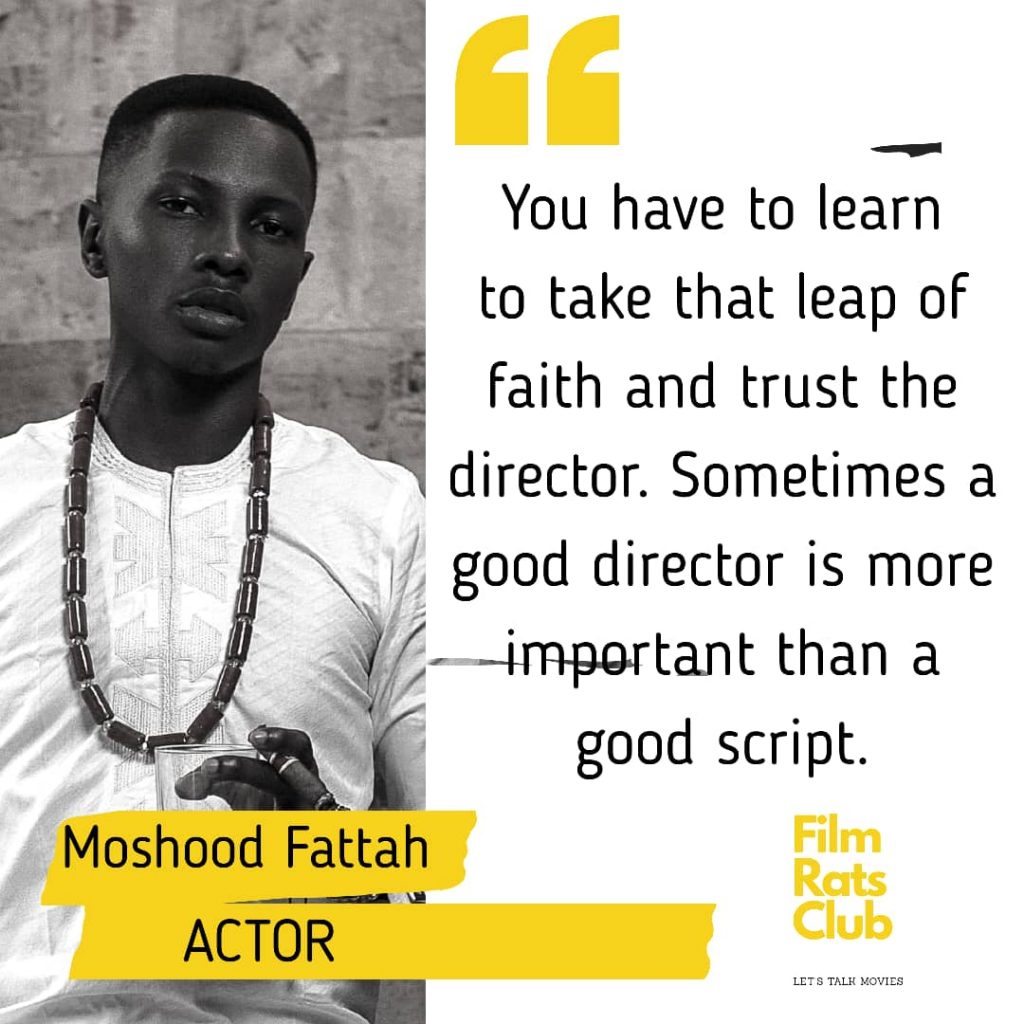Dialogues: Moshood Fattah on Acting
The first part will be on Acting Philosophy and the second part is titled “HARD TRUTHS”. Without further ado, welcome to Moshood Fattah’s Cheese Talk. “Intelligence is important.” I think when people talk about drama, they approach it from a rather formalist perspective; they see characters instead of human beings and dialogue instead of conversation. The biggest acting lesson is life itself and observing it is the best lecture. Everyday people go about trying to get something achieved and usually they have to get through an obstacle (almost always in form of a human being) in order to get it. It is the application of a method or combination of methods which a person employs to surmount an obstacle in order to get what they want that constitutes the core of acting. Let’s use a real-life example; A woman wants her husband to change the outfit he just put on because she thinks it’s horrible… But she can’t just command him to change the outfit, it may bruise his ego, he may feel insulted and prove stubborn to protect his feelings. So, what does she do? “Honey, I like the way you look this morning- are you sure it’s just work you’re going to? Oh wait- You know what, I think if you wore that black cap, it will look even better!” From the above, we can deduce certain tacts that the wife employed; Flattery, stroking of her man’s ego, feigning appreciation of the outfit and pretending like the suggestion to try a different cap came to her in that moment. You can imagine that her tone of voice will be cheery and soft. Cool right? Well, except that- the man didn’t bulge. Then she goes again…”I’m serious I swear, this blue cap makes you look like those illiterate Yoruba men. People will just be making fun of my husband. Baby, please change it.” Another set of tacts are employed here; Shaming, negative comparison, fear, soft requests…In less than 2 minutes of dialogue, the wife employed about 10 different tactics to get her husband to do what she wanted him to do. Great performances come from recognising that humans are great thinkers. Acting exercise: OBSERVE PEOPLE, notice how they lie, exaggerate, intimidate, open up to or close up from people. Your mind is more powerful than you know, it is tirelessly absorbent and by observing people, not only will you pick up new ways of expression, you’ll increase your capacity to read, predict, analyse, manipulate but most importantly EMPATHISE with people & develop the material (script) you’re working on. EMPATHY Collegiate Definition: The action of understanding, being aware of, being sensitive to, and vicariously experiencing the feelings, thoughts, and experience of another of either the past or present. In simpler terms, empathy is what you do when you put yourself in someone else’s shoes. It is not pity or sympathy, it is inheriting a person’s emotional state as if what they’ve also gone through what happened to you. It is the reason why you see movies where the acting is so good you forget they are acting and you cry with them when they die/lose. Well, it’s just a movie, they’re just acting. However, your mind processed it differently because it was too convincing. So, how do you get to that level of performance? It’s simple really. Have a heart. Harness the discipline to forget yourself. An actor must be a truly loving, caring person who doesn’t run away from emotions or hesitate to be open about his feelings; fears, dreams, hopes and insecurities. A lot of the time, actors are concerned with “being someone else” and are quick to change accents, gaits and idiolects. What they end up playing are flat stereotypes, not “people.” Real acting requires you to be able to strip yourself naked (metaphorically, sometimes literally) I. A lot of the time, as humans we hide from our feelings or lock them up on purpose. Actors can’t do that, you’re depriving yourself of opportunities to expand your emotional range. Don’t be like those actors who say “I don’t know how to be angry.” Acting Exercise: Confide in a trusted friend (or a group of friends) about an emotionally difficult time in your life or about a very embarrassing/bad thing you did that they never knew about. Not via text, but face to face. Narrate the story and live through every moment of it as you tell it, allow your mind experience it all over again, hold nothing back – embrace the hurt, anger, hatred, regret and laughter that comes with it, all these feelings will come in handy as an actor. Of course, it’s going to be exhausting and difficult to express, but hey- even in acting, characters always have to deal with internal conflict. Confront yourself! The more conversant you are with your emotions, the easier it will be for you to tap into them when acting. You have to keep your engine oiled and warmed. ON FORGETTING YOURSELF You can almost do no wrong when you’re in character. Being/Staying in character in my own experience is the greatest acting hack. The more time you spend being that person, the more natural, honest and consistent your performance will be, because you’re no longer acting, you’re BEING a different person and your body will adapt to the vocal/emotional/behaviourial notes you have to hit. I’ll take an example from a short film I did last year titled ‘ISOLATED.’ Although it is yet to be released, this is a link to a BTS footage. In it, I play a guy who exhibits high spectrum characteristics of Asperger’s Syndrome, a condition that affects behavioural, muscular and mental balance. I doubt I have ever come across someone with that condition till date. Let me give you three quick anecdotes; #1. The next day after shooting, a lady saw me and screamed! Apparently she had been on set that day and saw me in a corner; thinking I was actually


